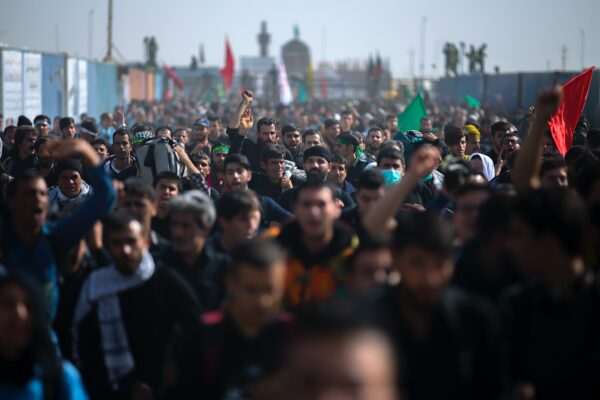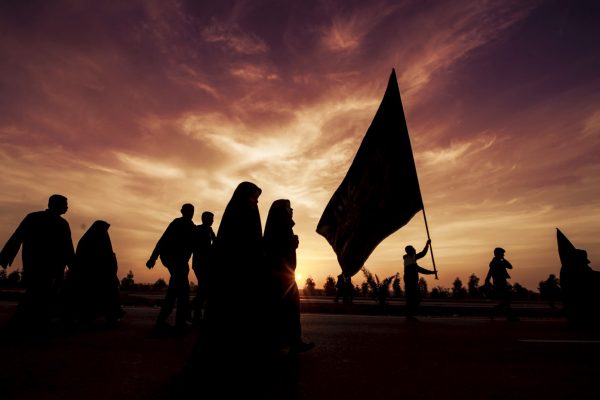How much do you know about one of the most influential and devoted servants of the Prophet Muhammad?
How much do you know about one of the most influential and devoted servants of the Prophet Muhammad?
After the demise of Hazrat Fatimah Zahra (s.a), Hazrat Ali (a.s) followed the will of his wife, Syeda Fatimah bint Muhammad (s.a), and contracted a second marriage with Fatimah bint Huzam, also known as Umm al-Banin, from the Banu Kilab tribe. She held infinite respect and love for Syeda Fatimah Zahra (s.a) and her children. She regarded herself as the servant of Syeda Fatimah bint Muhammad (s.a)’s household.
On the 4th of Sha’ban, Allah blessed Hazrat Ali (a.s) and Hazrat Umm al-Banin (s.a) with a son, named Hazrat Abbas ibn Ali (a.s). Hazrat Abbas (a.s) was courageous like his father and held an immense love and respect for the family of Syeda Fatimah bint Muhammad (s.a), much like his mother. Hazrat Abbas (a.s) is also known as “Qamar al-Bani Hashim,” “Bab al-Hawaij,” “Alamdar-e-Hussain,” and “Saqqa-e-Sukayna.”
It is said that Syeda Fatima (s.a) fervently prayed for a brave and powerful son who would assist Imam Hussain (a.s) at Karbala. As a result of the supplications of Hazrat Fatimah Zahra (s.a), Allah, the Almighty, bestowed Hazrat Ali (a.s) with Hazrat Abbas (a.s).
There was boundless love between Imam Hussain (a.s) and Hazrat Abbas (a.s). Imam Hussain (a.s) gave the adhan (call to prayer) in the ears of Hazrat Abbas (a.s). Despite being the brother of Imam Hussain (a.s), Hazrat Abbas (a.s) considered himself his devoted servant because he had immense respect for the family of Prophet Muhammad (saww). He would respond with unwavering obedience to every command without preamble, declaring “Labbayk” (at your service).
In the Battle of Siffeen during the 34th Hijrah, eight-year-old Hazrat Abbas witnessed Imam Hussain (a.s) fighting on the battlefield. When he spotted an enemy closing in on Imam Hussain (a.s) from behind, the fearless young Abbas took a sword, charged into the battlefield, killed the enemy, and with a resounding cry proclaimed, “How can anyone dare attack my Mawla while I am alive?”
Hazrat Abbas and the Epitome of Loyalty
Before the battle in the fields of Karbala, Imam Hussain (a.s) extinguished the lanterns at night and said to his companions, “If anyone among you wishes to save his life and leave, he can do so. I will not complain about it on the Day of Judgment.” In narrations, it is mentioned that three times, for this purpose, the lanterns were extinguished, and each time, Imam Hussain (a.s) instructed Hazrat Abbas (a.s) to light the lanterns. Because Imam Hussain (a.s) knew, “Even if everyone abandons me, Abbas will stand by my side.”
In the Battle of Karbala, the flag of Imam Hussain’s (a.s) army was also in the hands of Hazrat Abbas (a.s). He is admired as “Abbas Alamdar” and “Alamdar-e-Hussain.” Even after 1400 years, the flag of Abbas is still waving. The continued presence of Alam-e-Abbas on buildings is evidence that the battle between truth and falsehood, which occurred on the plains of Karbala 1400 years ago, is still ongoing. Its flag-bearer is Abbas (a.s), and its leader is Imam Hussain (a.s).
Abbas’s loyalty is beyond words. In the scorching desert of Karbala, after days of unbearable thirst, it was hard for Hazrat Abbas (a.s) to see innocent children thirsty.
Yazid’s army, opposing Imam Hussain’s army, had control over the Euphrates River. When Hazrat Abbas (a.s) crossed through the enemy’s army on his horse, a disturbance arose in their ranks, and fear gripped them, because no one was unfamiliar with the bravery of Abbas (a.s). Hazrat Abbas (a.s) reached the banks of the Euphrates River carrying Sukayna’s (a.s) water container. Despite being parched, Abbas (a.s) didn’t take a sip because members of the Prophet’s family were thirsty in the tents.
Imagine someone, parched in a scorching desert for days, standing by a river but choosing not to drink. Why? Because he didn’t want to drink water while his brother and his family were still thirsty. Hazrat Abbas (a.s) set an unmatched standard of loyalty.
The real grave of Abbas (a.s) is inside the sardab of his shrine, with water circumambulating the blessed grave of Hazrat Abbas (a.s).
This is a living miracle bestowed by Allah, the Almighty, in recognition of the loyalty of Hazrat Abbas (a.s).
It is believed that Hazrat Abbas (a.s) is a priceless means of connection to Allah. Supplications made through his intercession are believed to never be rejected. Hazrat Abbas (a.s) had boundless love for Imam Hussain’s (a.s) young daughter, Hazrat Sukayna (a.s). Referring to Hazrat Abbas (a.s) as the “Saqqa-e-Sukayna” and seeking his intercession through Hazrat Sukayna bint al-Hussain (a.s) is believed to swiftly result in the acceptance of prayers.
Imam Sadiq (a.s) stated: “Our paternal uncle Abbas (a.s), the son of Ali (a.s), attained unparalleled ‘Marifat’ (insight) and unwavering faith.” (This is recorded in A’yaan ul Shia, volume 7, pg430).
The holy shrine of Hazrat Abbas (a.s) is situated in close proximity to the holy shrine of Imam Hussain (a.s). Those who are devoted to Imam Hussain’s (a.s) legacy find solace and offer their heartfelt presence at the holy shrine of Hazrat Abbas (a.s).
The holy shrine of Hazrat Abbas ibn Ali (a.s) stands as a sacred tribute to his resolute loyalty and sacrifice during the Battle of Karbala. Characterized by majestic and intricate architectural design, it creates a spiritually uplifting atmosphere. The tall minarets, rising gracefully alongside the grand dome, add an elegant touch to the architecture. The shrine includes areas for prayer, contemplation, and gatherings, providing a space for devotees to connect with the profound legacy of Hazrat Abbas (a.s).
The gates of Hazrat Abbas (a.s)’s holy shrine serve as symbolic entry points, each named with significance, and adorned with intricate designs and calligraphy. These gates not only serve as physical passages but also symbolize spiritual journeys, inviting devotees to partake in the sanctity of the shrine and connect with the enduring spirit of Hazrat Abbas ibn Ali (a.s). This majestic structure serves as a beacon of spiritual devotion, drawing believers worldwide to pay homage to Hazrat Abbas ibn Ali (a.s).
Indeed, the holy shrine of Hazrat Abbas (a.s) is one of the places about which Allah Almighty said: “(This Light of Allah illumines) such houses (mosques and canters) as Allah has ordained to exalt (i.e., enhance their esteem and honour) and remember His Name therein. (These are the houses) in which (Allah’s servants) glorify Him morning and evening.” (Quran, 24:36)





